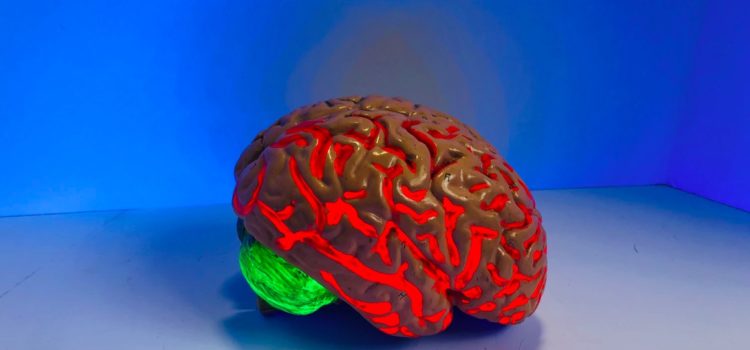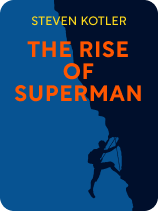

This article is an excerpt from the Shortform book guide to "The Rise of Superman" by Steven Kotler. Shortform has the world's best summaries and analyses of books you should be reading.
Like this article? Sign up for a free trial here.
What’s the relationship between a flow state and brain waves? How do your brain waves change when you enter a flow state?
According to Steven Kotler’s book The Rise of Superman, in a flow state, the brain waves you produce temporarily change, allowing you to perform at your best. He specifically describes five of the brain waves that are positively affected by entering a flow state.
Read on to learn more about how achieving a flow state affects brain waves, according to Kotler.
Flow State & Brain Waves: The Positive Connection
According to journalist Steven Kotler, in a flow state, temporary changes occur in your brain that allow you to perform at your best. Specifically, your brain activates the regions associated with intuitive thinking and releases neurotransmitters, enabling you to perform at a higher level. Kotler’s book, The Rise of Superman, explains the connection between entering a flow state, brain waves, and enhanced brain performance. In this article, we’ll explain this relationship in detail.
Intuition Overtakes Conscious Thinking
In a state of deep focus, the regions of your brain dealing with conscious, higher thinking deactivate, while the parts associated with intuition activate. Your brain siphons energy away from non-essential, higher functions, such as your sense of time and your self-awareness. For example, you might forget to eat because you’re less aware of your bodily needs.
(Shortform note: In Blink, Malcolm Gladwell refers to using the intuitive parts of your brain as “unconscious thinking” and argues that it can be an effective form of decision-making if you have ample past experience to draw from. He explains that your unconscious mind “thin-slices” your past experiences: In other words, your brain picks out relevant information from your past experiences and identifies patterns to make quick decisions about how to approach your current situation.)
Your brain directs this energy, instead, to other parts of the brain that increase mental clarity, creativity, and decision-making speed. With less self-awareness, you experience less doubt and take more creative risks. As a result, making decisions feels quick and effortless. Some people have described this heightened intuition as “a voice” telling them what to do, while others describe it as feeling “one” with their environment.
(Shortform note: In The Gifts of Imperfection, Brené Brown agrees with Kotler that intuition is a powerful decision-making tool and believes we should use intuition more in our daily lives. She adds that many people struggle to trust their intuition because they’re afraid of being wrong. However, she argues that being able to trust your gut feeling is crucial to increasing your self-worth and advises you to practice believing that things will work out even if you aren’t certain that they will.)
A flow state also affects which brain waves you produce. Your brain produces five different types of electrical waves depending on your state of consciousness:
- Delta waves occur when you’re in a dreamless sleep.
- Theta waves occur when you’re deeply relaxed.
- Alpha waves occur when you’re alert yet calm.
- Beta waves occur when you’re focused and actively thinking.
- Gamma waves occur when you’re in deep concentration.
| Binaural Beats: Can You Induce Brain Waves With Sounds? Kotler explains that we experience different states of consciousness depending on different patterns of brain waves, but is it possible to control what state you’re in? Like all waves, brain waves have different speeds, or frequencies, which are measured in hertz (Hz). Since sound is also a wave, researchers are looking into the possibility of influencing your brain waves using sounds called binaural beats. These beats are an auditory illusion that occurs when you listen to a slightly different frequency of sound in each ear. Through a process called entrainment, your brain perceives this as a third sound and synchronizes with it to produce the brain wave that corresponds with that frequency. While the evidence isn’t definitive, studies suggest that binaural beats may have beneficial health effects, such as improving your creativity and ability to concentrate, as well as reducing stress and anxiety. The theory is that you can listen to different frequencies of binaural beats to achieve certain brain states: – 1 to 4 Hz: This range of frequencies corresponds with delta waves, the slowest brain wave. Listening to binaural beats in this range may encourage more delta wave activity and help you get more deep sleep. – 4 to 8 Hz: This frequency range corresponds with theta waves. Listening to binaural beats in this range may help you relax and relieve stress. Experts explain that theta wave activity is important for us to process information and memories. – 7 to 13 Hz: This range corresponds with the alpha state. Listening to binaural beats in these frequencies may increase relaxation and reduce anxiety. – 13 to 30 Hz: This frequency range corresponds with beta waves. Beta range binaural beats may increase your ability to concentrate. – 35 Hz and Above: These frequencies match with the gamma state. As Kotler has discussed, gamma waves occur when you’re in high focus. Listening to binaural beats in this range may improve your creativity and cognitive abilities. |
Three brain waves come into play when you’re experiencing a flow state: theta, alpha, and gamma. When your brain shifts energy to its intuitive regions, your brain waves slow to a theta and alpha state. Once you’re in this state, your brain can produce bursts of gamma waves that help you make creative insights.
(Shortform note: Researchers offer additional insights on gamma waves and creative insights by explaining what occurs inside your brain when gamma wave activity increases. They argue that these high-speed waves allow your brain to draw connections between loosely related pieces of information that you might not otherwise connect. They also help minimize visual distractions, which allows you to form and become consciously aware of these new insights.)
Kotler writes that one major reason extreme athletes can perform past their limits is that they’ve learned to generate these brain waves at the right moment. For example, the focusing and creative power of gamma waves can be seen in surfer Laird Hamilton’s ride of the Millennium Wave, one of the biggest and most dangerous waves ever surfed at the time. To prevent himself from getting sucked into the wave, Hamilton intuitively stuck his back hand in the water—something no one had ever done before. Kotler explains that, since Hamilton was in the theta and alpha flow state (relaxed, alert, and calm), his brain was able to generate the gamma waves needed to spark this life-saving insight.
(Shortform note: Many surfers consider Hamilton’s ride of the Millennium Wave in 2000 at Teahupoo, Tahiti as one of the most significant moments in surfing history. The wave is known for being dangerous, having taken the life of a local surfer just months before Hamilton’s ride. While Kotler points out the important role that flow and creative insights played in saving Hamilton’s life, others emphasize that Hamilton’s years of dedicated practice and training allowed his body to adapt to the situation and successfully ride the wave.)

———End of Preview———
Like what you just read? Read the rest of the world's best book summary and analysis of Steven Kotler's "The Rise of Superman" at Shortform.
Here's what you'll find in our full The Rise of Superman summary:
- The importance of mastering flow for any activity
- The neuroscience behind the flow state
- Techniques for how you can encourage deep focus into your life






